Israeli Physicist Warns About Reports Of Iran’s Enriched Uranium
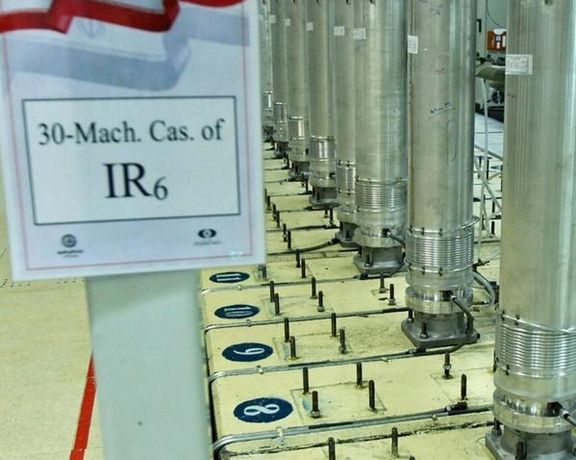
An Israeli nuclear physicist has warned that Iran’s enrichment of uranium to 84 percent could be sufficient for the production of atomic bombs.

An Israeli nuclear physicist has warned that Iran’s enrichment of uranium to 84 percent could be sufficient for the production of atomic bombs.
The scientist said that bomb dropped by the US on Hiroshima in 1945 had uranium with 80% purity.
Naama Charit Yaari told The Jerusalem Post that if the Americans had had time to enrich the uranium to 93% or 94%, the damage would have doubled.
However, she said she doesn’t know for sure if Iran has really enriched to 84% purity or left its supplies at “only” 60% as it has claimed.
UN's International Atomic Energy Agency (IAEA) inspectors detected near bomb grade enriched uranium in Iran last week, Bloomberg reported on Sunday.
Quoting “two senior diplomats” the report said that the IAEA found uranium enriched to 84 percent, while previously Iran was enriching up to 60-percent purity. Enrichment above 90 percent would mean a decision to become a nuclear threshold state.
Bloomberg says that the IAEA needs to determine whether the higher-grade enrichment was intentional or the result of unintended technical processes. Earlier this month, inspectors had found an unusual set-up in interconnections of enrichment machines, called centrifuges.
The spokesman for the Atomic Energy Organization of Iran rejected Bloomberg's report as "distortion of facts" and said, "We have not enriched uranium to purity levels above 60 percent so far." He added that the IAEA has informed Tehran that "the presence of uranium particles with above 60-percent purity is common in sampling."
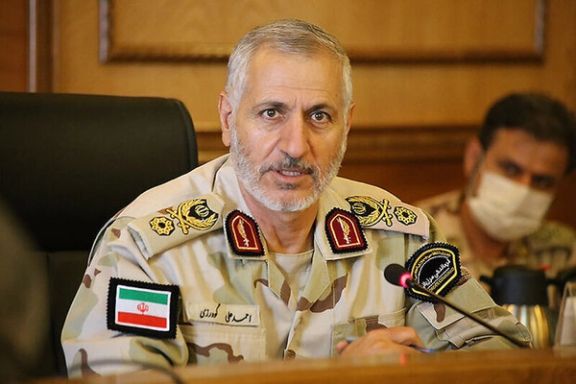
The commander of Iran’s Border Guard claim that a vessel carrying US-made weapons, including “swords” was seized in the Persian Gulf.
Ahmad Ali Goudarzi said the vessel was carrying more than 5,000 machetes and swords made in the United States, claiming that when more blood touches the blades, the sharper they get.
He did produce any photos, evidence or provide other details about the alleged vessel or if any crew were arrested.
Stating that Iran also seized electronic cigarettes and various harmful systems made in the United States, Goudarzi added that over 3,000 other weapons were also discovered that were supposed to be given to the “rioters” in Iran.
Hardliners led by the IRGC call Iranian protesters “rioters” and “thugs”. Iran has been the scene of anti-government protests since September when the 22-year-old Kurdish girl Mahsa Amini was killed in police custody.
The claims by Goudarzi come after the US military announced earlier this month that the US Navy assisted the French military in seizing thousands of assault rifles and half a million rounds of ammunition that were being transferred from Iran to Yemen in January.
US Central Command confirmed over 3,000 assault rifles, 578,000 rounds of ammunition, and 23 anti-tank guided missiles were confiscated.
It also added that the seizure is “one of four significant illicit cargo interdictions over the past two months,” which has prevented the transfer of more than 5,000 weapons and 1.6 million rounds of ammo to Yemen. Another seizure of arms was announced earlier in January.
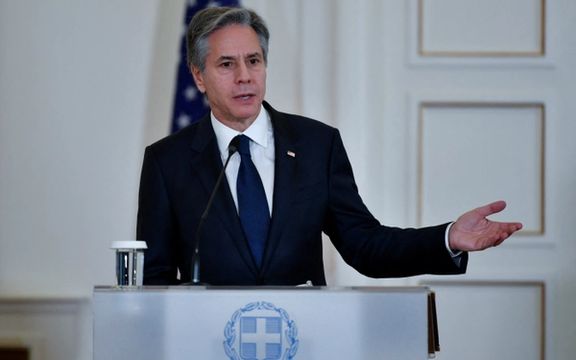
US Secretary of State Antony Blinken said Tuesday it was up to Iran to resolve a deadlock in nuclear talks and accused it of enabling Russian aggression in Ukraine.
Blinken, who was visiting Athens, said the United States was committed, together with Israel, to ensuring that Tehran "never acquires a nuclear weapon".
"That's not exactly news. The president (Joe Biden) has been very clear that every option is on the table to do that," Blinken told a news conference alongside his Greek counterpart, Nikos Dendias.
Biden's administration had been trying to resurrect the 2015 agreement, the Joint Comprehensive Plan of Action (JCPOA), which was abandoned by Biden's predecessor Donald Trump in 2018, but talks lasting 18 months deadlocked in September.
Soon antigovernment protests broke out in Iran that were met with deadly force by the government, killing 500 civilians, further complicating relations with the West.
Blinken accused Tehran of failing to engage and said the JCPOA was not on the table now.
"We continue to believe that, with regard to the nuclear program, the most effective, sustainable way to deal with the challenge it poses is through diplomacy. But in this moment, those efforts are on the backburner because Iran is simply not engaged in a meaningful way," Blinken said.
"A lot depends on what Iran says and does and whether or not it engages."
Blinken added: "In the meantime, of course, we've seen provision by Iran of drones to Russia to enable its aggression in Ukraine."
He called the invasion a "strategic failure in every way" for Russian President Vladimir Putin.
With reporting by Reuters
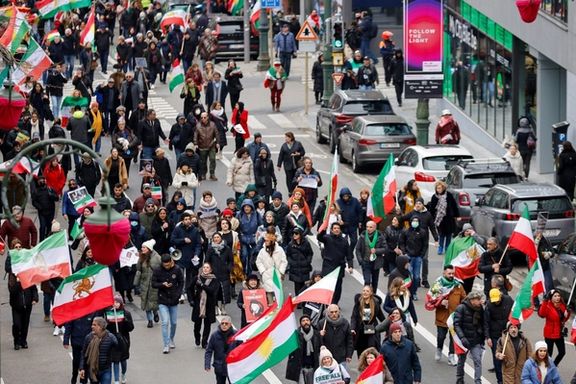
An estimated crowd of more than 20,000 held a rally in Brussels to call on EU countries to designate Iran’s Revolutionary Guard as a terrorist organization.
A diverse group of figures delivered speeches in the Belgian capital condemning the Islamic Republic and its multifunctional armed force, the IRGC, expressing solidarity with the dissidents in Iran who have been out on streets since September protesting for the fall of the clerical regime.
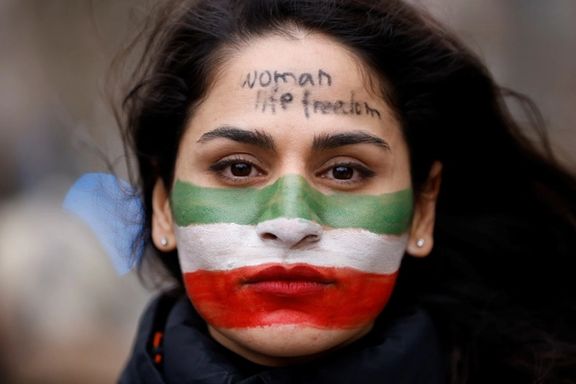
Alireza Akhondi and Darya Safai, two representatives of Iranian origin in the parliaments of Sweden and Belgium were among the original organizers of the rally, meant to push the EU for the inclusion of the IRGC in the list of terrorist organizations in the European Union.
During the demonstration – accompanied by musical and theatrical performances, women’s rights activist Masih Alinejad called for unity among Iranian opposition figures, a demand which has been echoed repeatedly by prominent activists since a historic forum in Washington earlier this month by eight prominent dissident activists heralded a united front.
Alinejad said, "The secret of our victory is our unity. We are scarred by the same regime for years... We will not win if we do not hold each other's hands."
Canada-based activist leader Hamed Esmaeilion, whose daughter and wife were killed by the IRGC in the shooting down of a Ukrainian airliner in 2020, said that the Revolutionary Guard was established to defend the Islamic Revolution and not the Iranian people. "There is still no mention of Iran in the name of this institution," he noted. "After the war with Iraq, the Revolutionary Guard became an economic and security monster, and today it is the most important instrument to suppress the people of Iran," he added.
"In future Iran, there'll be no IRGC. Army will protect the country's territorial integrity. Military won't interfere in politics. And the economy will be controlled by experts instead of eulogists in uniform," he said.
Former US President George W. Bush, NATO Secretary General Jens Stoltenberg, Iranian Nobel Peace Prize Laureate Shirin Ebadi, member of the Chamber of Representatives of Belgium Theo Francken, Former Assistant to the US President for National Security Affairs John Bolton, Executive Director of United Nations Watch Hillel Neuer, Member of the European Parliament Abir Al-Sahlan, and member of the Hamburg city parliament Danial Ilkhanipour delivered speeches or sent messages for the Brussels rally.
Concurrent with the gathering in the Belgian capital, another rally was held in the German city of Dusseldorf.
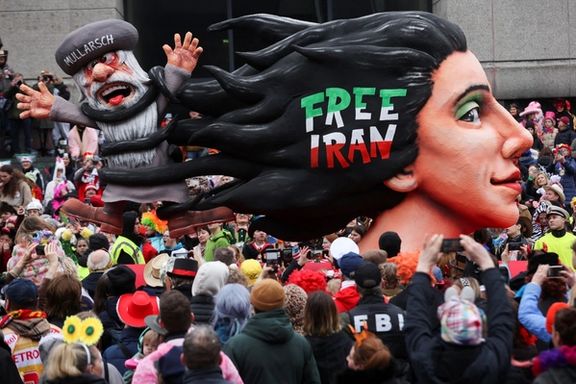
Also on Monday, the EU sanctioned 32 Islamic Republic officials, including culture and education ministers, deputy IRGC commander, and several MPs. The move can be seen as a measure to justify the fact that the EU is not yet ready to designate the entirety of the IRGC.
European Commission President Ursula von der Leyen said last week that the EU would propose sanctions targeting for the first time Iranian economic operators involved in the Russian war in Ukraine. "For the first time we are also proposing to sanction Iranian entities including those linked to Iran's Revolutionary Guard," she said.
In January, the block's foreign policy chief Josep Borrell said that the European Union cannot list the IRGC as a terrorist entity until an EU court has determined that they are, noting "Ministers adopted a new package of sanctions against Iran, targeting those driving the repression. The EU strongly condemns the brutal and disproportionate use of force by the Iranian authorities against peaceful protesters," he said but no action was taken to designate the IRGC.
There have been numerous Iranian terror acts in Europe, where courts have indicted top officials. In addition, IRGC’s record in organizing attacks elsewhere are well-documented. Critics say that Borrell is focused on re-starting nuclear talks with Iran after the previous long round of negotiations in 2021-2022 ended last September without success.
The European Parliament has called on the EU to list the Revolutionary Guards as a terrorist entity, blaming it for the repression of domestic protests and the supply of drones to Russia.
Moreover, EU legal experts have declared that the bloc does not currently have legal grounds to list Iran's Revolutionary Guards as a terrorist organization, German Foreign Minister Annalena Baerbock said on Monday.
"As of now, we don't have legal grounds in the EU to list the Revolutionary Guards as a terrorist organization," Baerbock told reporters at the end of a meeting of EU foreign ministers in Brussels.
The United States has said it is not pursuing the revival of the 2015 nuclear deal, or the JCPOA, and instead its attention is on the popular movement in Iran and on Tehran’s supply of kamikaze drones to Russia.
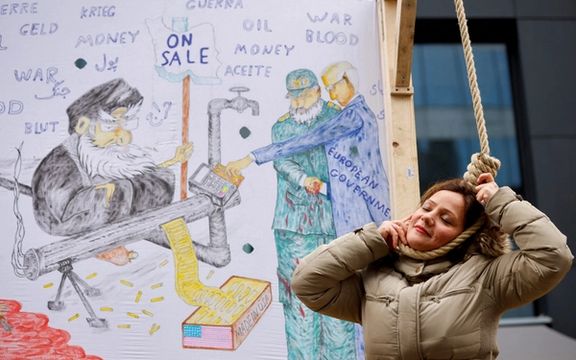
The IRGC was set up shortly after the 1979 Islamic Revolution to protect the Shi’ite clerical ruling system and provide a counterweight to the regular armed forces.
It has an estimated 125,000-strong military with army, navy and air units. It also commands the Basij religious militia, a volunteer paramilitary force loyal to the clerical establishment which is often used to crack down on anti-government protests.

The Islamic Republic says it will grant 1,000 square meters of farmland to the assailant who stabbed Salman Rushdie, the British author of The Satanic Verses.
Mohammad Ismail Zarei, head of the Secretariat to Implement Khomeini's Fatwa on Execution of Salman Rushdie said Monday that “We sincerely thank the young American for his brave action in carrying out the historic fatwa of Imam Khomeini.”
Rushdie was stabbed in the neck and torso on stage at a lecture in New York State by Hadi Matar, a 24-year-old man in August 2022. He lost on eye and movement in his hand after a lengthy medical treatment.
“With this action, he blinded Salman Rushdie in one eye and disabled his arm to make Muslims happy,” he added.
“Although Salman Rushdie is nothing more than a walking dead, in order to honor this brave action, about a thousand square meters of a valuable and fertile agricultural land will be awarded to the stabber or his legal representative in a special ceremony.”
He went on to say that the remaining part of the land will be given to those who kill Salman Rushdie.
Rushdie lived with a bounty on his head since "The Satanic Verses" published in 1988 prompted Khomeini to issue a fatwa urging Muslims to kill him.
Many accused the Islamic Republic of having ties with the attacker, but Iran’s foreign ministry denied any links with the 24-year-old stabber. However, some hardliners and regime insiders expressed gratification after the attack.
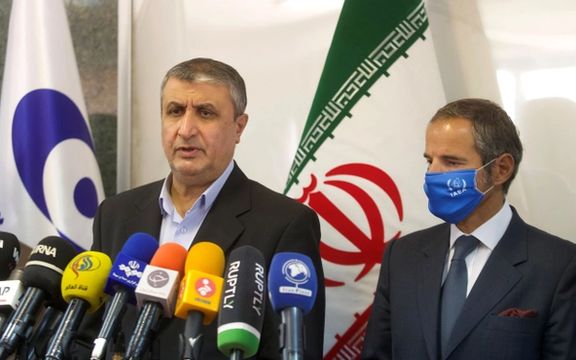
The IAEA said Sunday it was discussing with Iran the results of recent verification work, after a report that it had detected uranium enriched to weapons grade.
On Sunday, Bloomberg News quoted senior diplomats as saying that the UN watchdog, the International Atomic Energy Agency (IAEA) had recently detected uranium enriched to 84 percent while monitoring Iran’s nuclear facilities.
Iran has been enriching uranium to up to 60 percent purity since April 2021. Three months ago, it started enriching to that level at a second site, Fordow, which is dug into a mountain. Weapons grade is around 90%.
"The IAEA is aware of recent media reports relating to uranium enrichment levels in Iran," the International Atomic Energy Agency said on Twitter. "The IAEA is discussing with Iran the results of recent Agency verification activities and will inform the IAEA Board of Governors as appropriate."
The IAEA, which inspects Iran's nuclear facilities, flags significant developments in Iran's activities either in ad hoc reports to the 35-nation Board of Governors or regular quarterly ones issued before board meetings.
Diplomats said on Sunday evening that the IAEA so far had not issued any such report.
The Islamic Republic has reduced IAEA’s monitoring access to its activities since early 2021 and has violated limits set by the 2015 nuclear accord (JCPOA) that kept enrichment below 5 percent. Tehran began violating the limit in 2019, when the US imposed full oil export sanctions after withdrawing from the JCPOA.
Nearly two years of diplomatic attempts to restore the deal have failed, with the West also becoming critical of Iran’s bloody crackdown on popular protests and its supply of military drones to Russia.
Any of the three European signatories of the JCPOA, the United Kingdom, France or Germany could trigger a UN Security Council mechanism enshrined in the agreement, to reinstate international sanctions on Iran for its enrichment violations.
The IAEA Board of Governors will have its next meeting on March 6 and a report on Iran will be discussed. If the new violation is presented at the meeting, Western countries may decide to take the issue to the Security Council.
Israel has repeatedly warned that it will not allow the Islamic Republic to acquire nuclear weapons. Israel's Defense Minister Yoav Gallant said February 17 that "all possible means" were on the table to prevent Iran from building a nuclear weapon. Since the breakdown of the nuclear talks, US officials have repeatedly said that President Joe Biden will not tolerate a nuclear Iran.
Bloomberg reported earlier on Sunday that the IAEA was trying to clarify how Iran enriched uranium to 84%, citing two senior diplomats.
"Inspectors need to determine whether Iran intentionally produced the material, or whether the concentration was an unintended accumulation within the network of pipes connecting the hundreds of fast-spinning centrifuges used to separate the isotopes," Bloomberg reported.
It added that the detected material could have been "mistakenly accumulated because of technical difficulties in operating the centrifuge cascades — something that has happened before", citing one of the diplomats.
The spokesman for the Atomic Energy Organization of Iran rejected Bloomberg's report as "distortion of facts" and said, "We have not enriched uranium to purity levels above 60 percent so far." He added that the IAEA has informed Tehran that "the presence of uranium particles with above 60-percent purity is common in sampling."
With reporting by Reuters